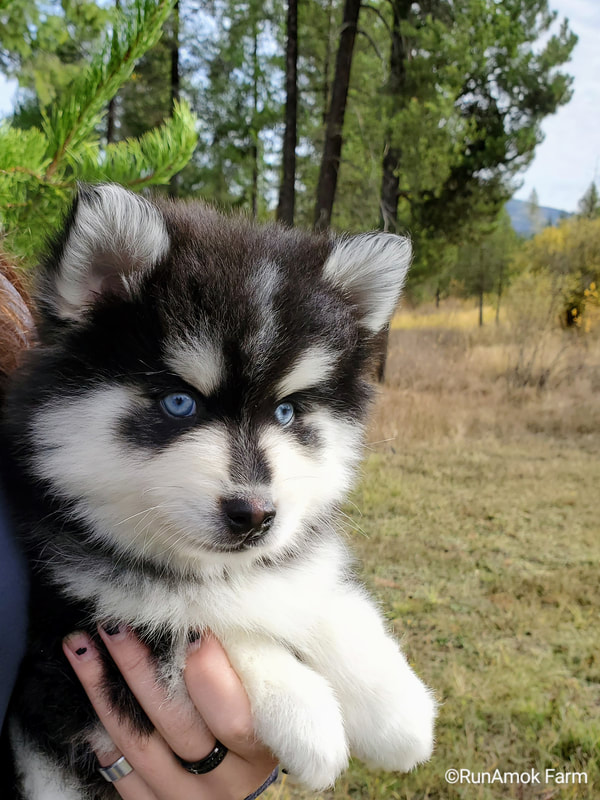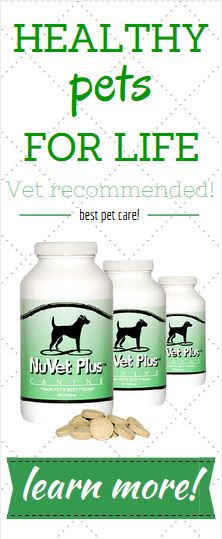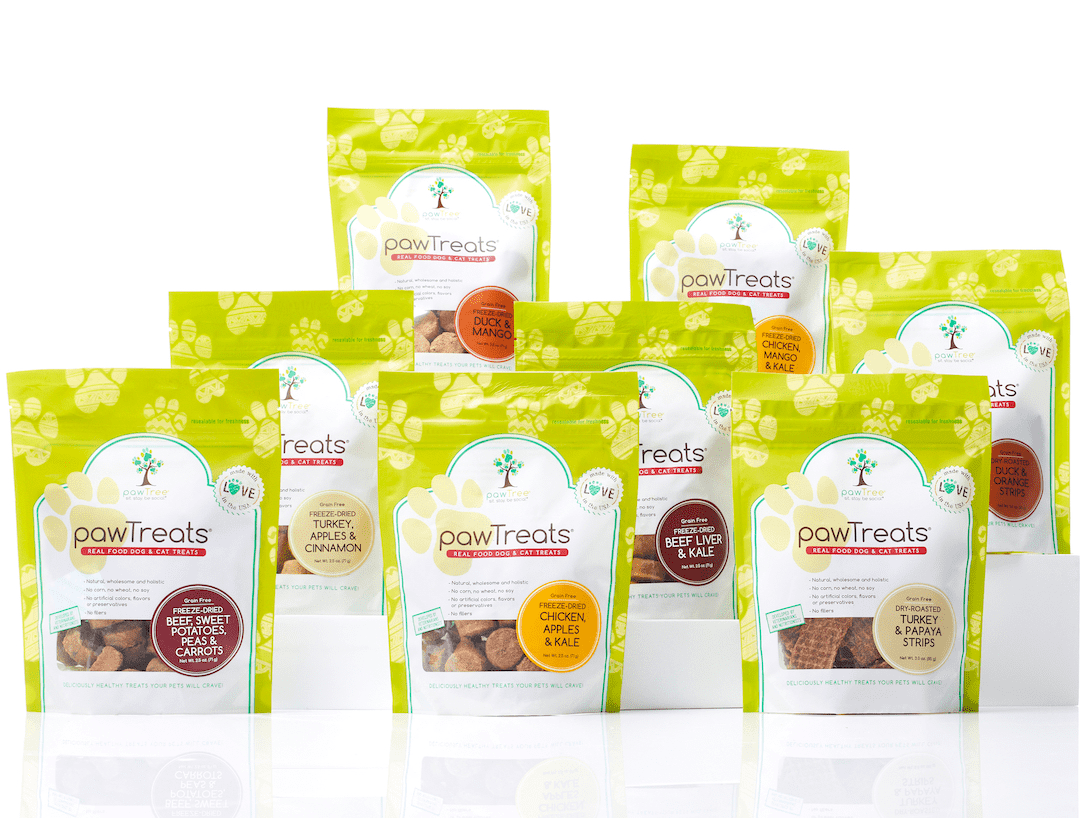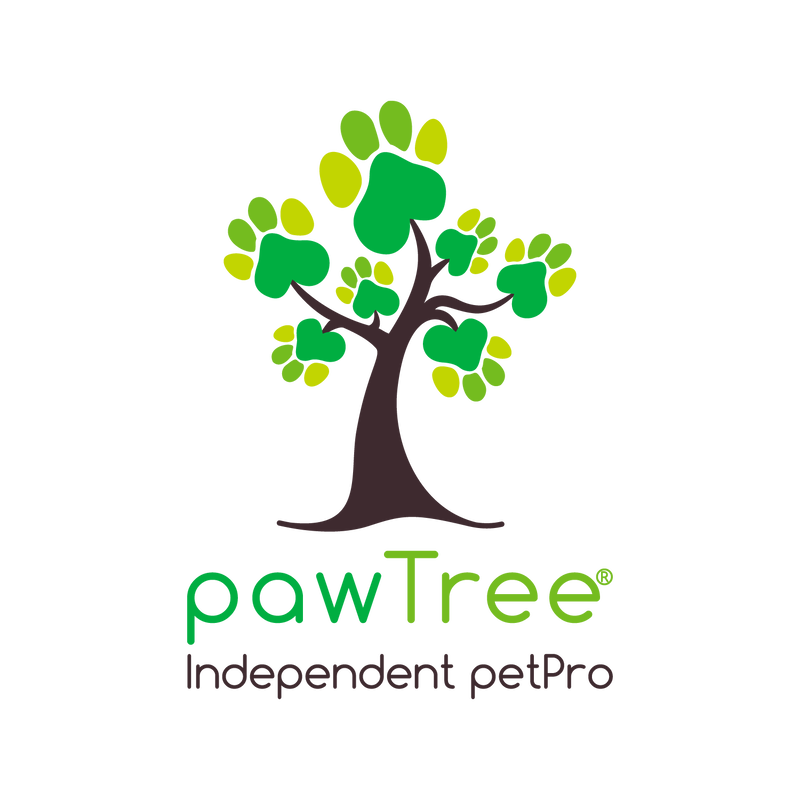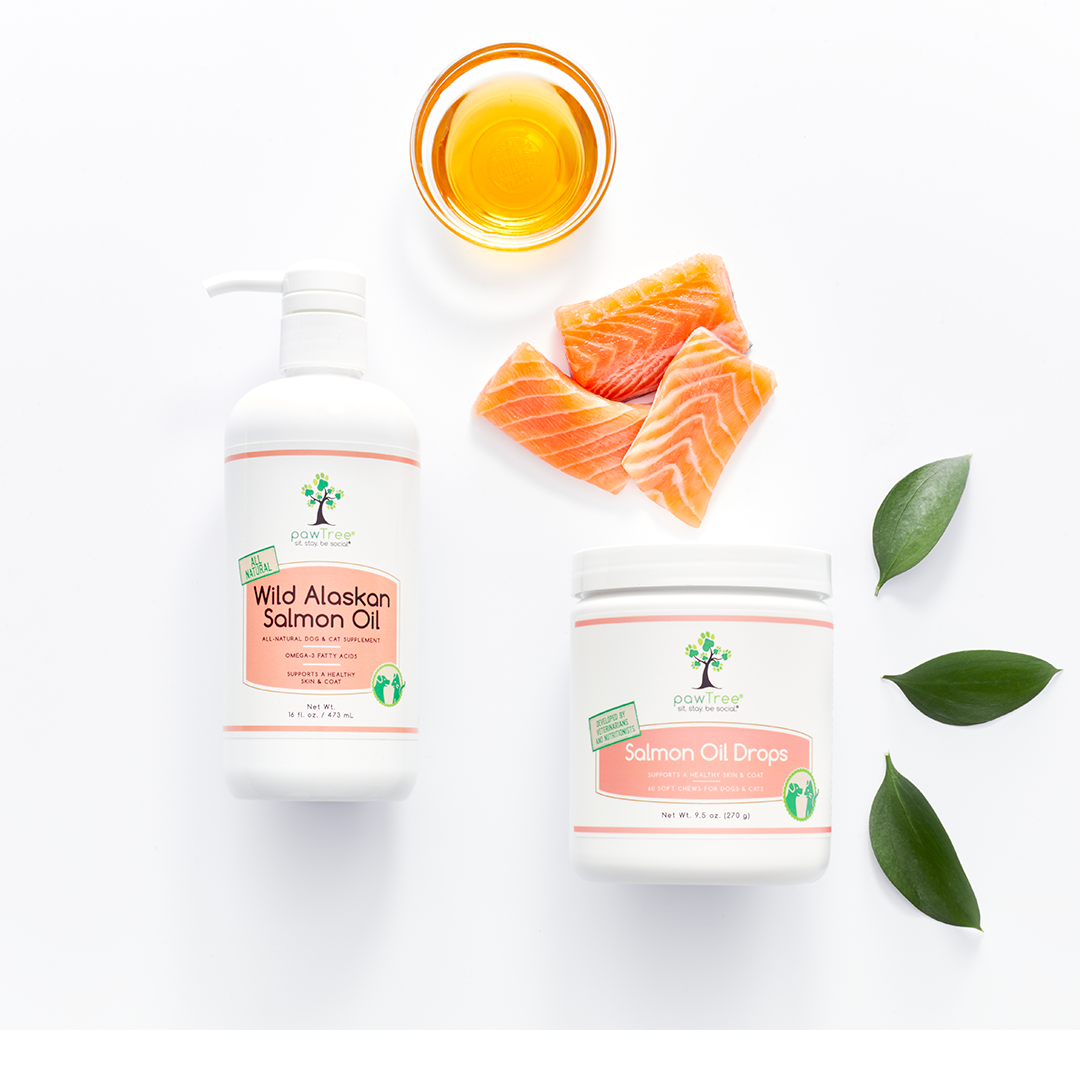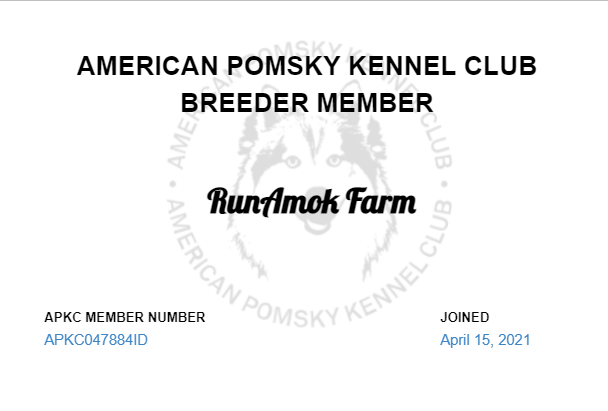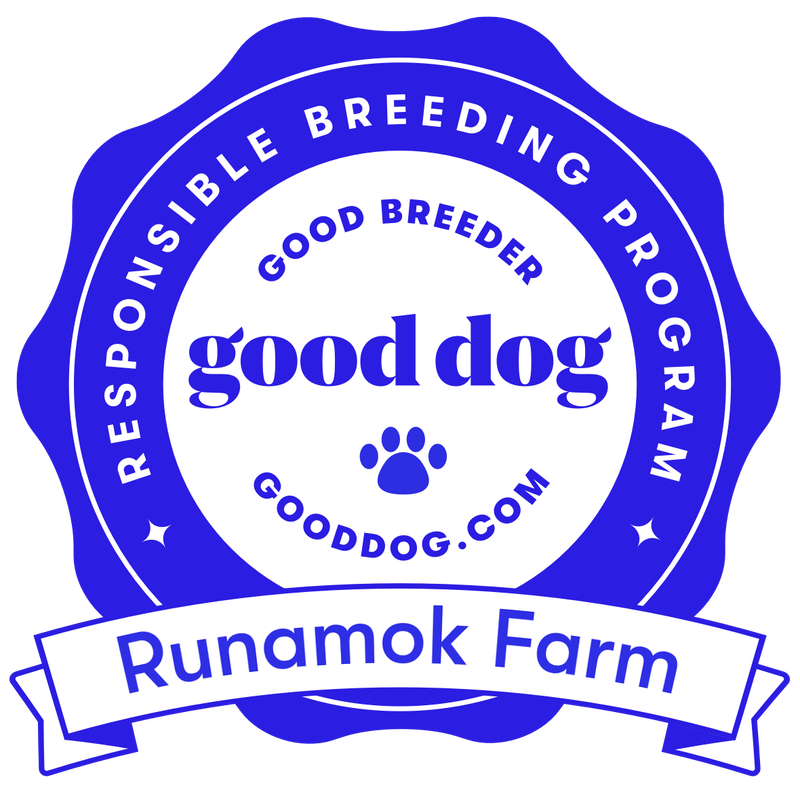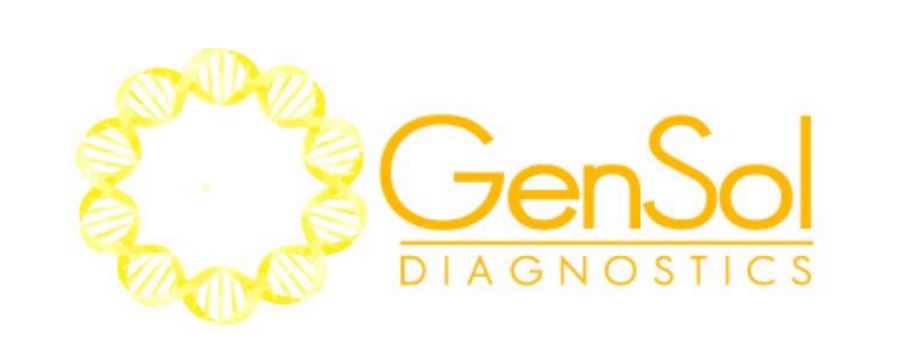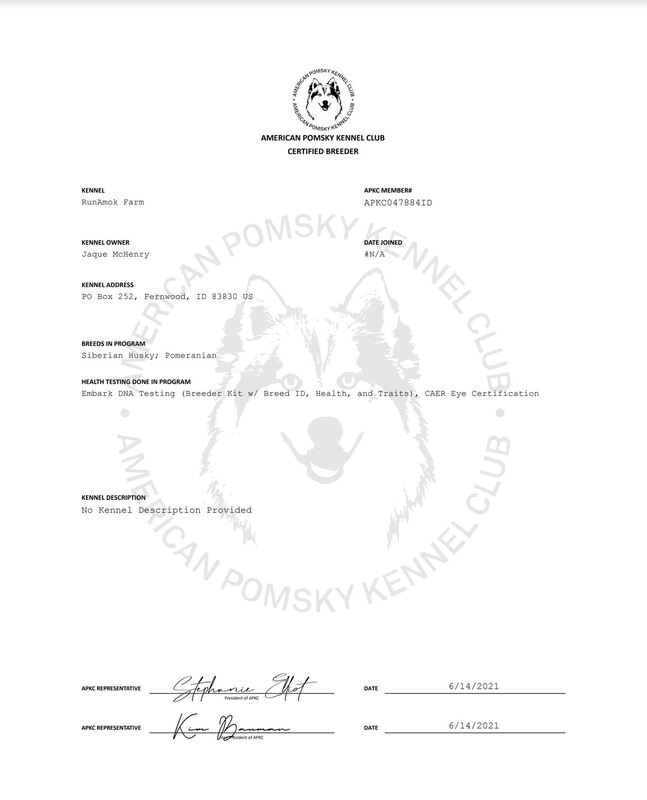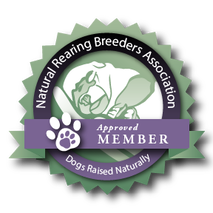RUNAMOK PUPPY ESSENTIALS Bringing home a new puppy should be a joyful experience! Doing so on a whim, without proper planning can create undue frustration for you and your puppy. With some planning, you will find the first weeks of transition and training will go more smoothly... and that IS something to be joyful about! 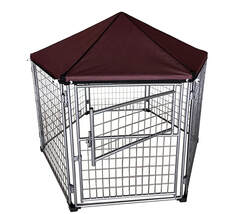 INTERIOR PUPPY EXERCISE PEN: These come in a variety of sizes, materials and styles, and can be purchased in pet stores, feed stores, or online. We list this item first as it will help you start your puppy off right, and will be one of your best house-training tools. For younger puppies and indoor use, we recommend a 4 - 5 foot tall, covered, 8-panel puppy pen. These pens can be positioned in a variety of shapes and angles (round, square, rectangle, even L-shaped) and will keep your puppy safe and out of trouble while you are not actively supervising them, whether you are just busy around the house or gone several hours for work. *Why covered? This prevents a younger puppy from climbing up and over the pen – once they do this, it is harder to prevent them from escaping as they get older. We want to develop good habits, not train escape-artists! For house-training, we usually place these pens on easy to clean flooring with a non-slip kennel pad (never on the carpet!) and not on plain wood or linoleum, as these slippery surfaces can cause issues with developing joints. Place their crate, food/water bowls, and a couple toys inside the pen, along with a potty tray (if continuing the tray-training we started here.) The goal is to contain the puppy, giving a safe space for sleep but also room to stretch and play with toys. Always work toward outside potty trips, but the tray can be used for times you will be gone hours in between. 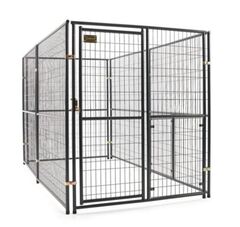 EXTERIOR WELDED WIRE PEN: These are absolutely worth their weight in gold. A 10X10 or larger, covered, welded wire kennel system will provide a safe place for your puppy outside. The puppy will h ave plenty of room to exercise while remaining safe from predators or other dogs which might come into your yard. While we don't like to think about such things, with a lock on the gate, a well-made pen is a deterrent from someone who might otherwise grab a puppy over your fence. (Not a substitute for real security systems.) These are absolutely a “win-win”, across the board. These are not just a “puppy item”, but an excellent option for adult dogs as well. 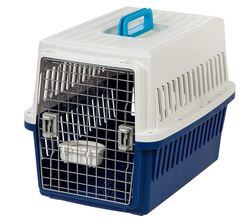 CRATE: How big and what kind? What you need honestly depends on how much traveling you intend to do. Enclosed, plastic, airline-approved crates, such as the "Petmate Sky Kennel" or “Iris Deluxe Pet Travel Carrier” are the most versatile as they are airline-approved and also fit nicely inside a vehicle. The metal indoor crates are common in many households, but are not our favorite. They take a bit more work to clean, and most brands are not nearly as convenient for travel. More important than cleaning, for a pup intent on escaping a crate, the metal bars can be chewed or bent, in at least some instances causing injury to the puppy or dog. Keeping in mind that most dogs are content in these wire crates, so if this feels like a better option and you will be around to supervise as your puppy settles in, this may be a fine option for your family. Whichever you choose, we definitely recommend continuing the crate-training we have started! *If you are shipping your puppy, he/she will arrive in a smaller, airline-approved shipping crate as described above. This will fit your puppy for a short time, but you will need to upgrade to a larger sizing if you wish to continue training to adulthood. We begin crate-training at around 7 weeks, so if you are meeting us in person you are welcome to purchase your puppy's new crate directly from us. Going home in the crate they already consider their “bed” can help them feel more secure while transitioning from our home to your home. 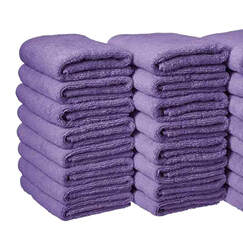 BEDDING: You can spend a lot of money on cute puppy blankets and padded beds, believe me. While these things can be “fun” and make you feel happy, the price adds up quickly. With typical puppy messes, exuberant play, chewing, and tug-of-war these expensive blankets or pads can be a waste of money on young puppies. We tend to be more practical: Nice, medium-quality bath towels are what we purchase and use for our puppy crates. Towels are hardy and made to be washed and dried frequently – and, compared to specialized puppy blankets, very inexpensive. Puppy bedding should be washed every few days, in hypoallergenic laundry wash (NO “GAIN” or overly-perfumed laundry soap) so we suggest saving your money and going with “practical” for the first few months. (Think Walmart or Amazon basic towels as they are inexpensive and easily replaced. 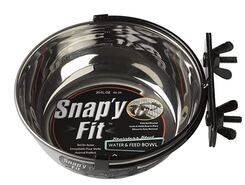 BOWL & WATER DISHES: The types of food and water bowls you use are important! As with puppy blankets, we can get caught up with the cute designs we see on plastic and ceramic bowls. Though fun, these are not a good choice. There is the obvious issue of chewing and possibly ingesting sharp chunks of plastic; ceramic bowls can be broken and cause injuries as well. A puppy can also develop an allergy to the plastic or sometimes the cheap glaze from products produced in foreign countries, resulting in itchy, weepy sores around their mouth and nose. Toxic metals can cause poisoning as well. It is best to purchase a set of food-grade, stainless steel bowls for both food and water. These do not have to be expensive – a decent set can be found for under $15 and will last for many years, if the puppies or kids don't take off with them! You can purchase ones which sit on the floor or ones that attach to the kennel. We like this style best for younger pups, so they don't drag their bowls around while playing. 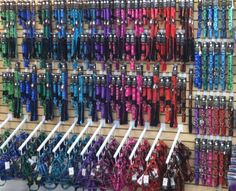 LEASH/COLLAR OR HARNESS: We believe in starting a puppy's training as soon as they come home. This does not mean one must follow rigorous training sessions every day – but the basics are readily teachable to very young puppies and for an exceptional, well-trained adult you will be proud of, we recommend starting young. Improperly fitted collars can result in serious injury, open sores, infection, and death. If a collar is too loose, a puppy can get its lower jaw hooked under the collar and break its jaw, or even hook a front leg through the collar, creating a serious strangulation hazard! Likewise, you will need to check daily to ensure your puppy's collar is not becoming too tight or causing raw spots around it neck as it is growing. This is where a quality collar is far better than a cheaper collar from a pet store, but even the most expensive collar can cause injury if it is not fitted correctly. Extra precautions should be taken in multiple-puppy homes as a pup can get its teeth or leg hooked through the other puppy's collar during playtime, resulting in jaw injury, leg injury, and potentially strangling the collared puppy. Leather collars are a “classy”, comfortable option for older adolescents and adults, if they will not be spending much time in the rain or swimming. Honestly, while any simple, well-fitted collar should work well, we prefer to upgrade a bit and buy better quality collars. Alternately, a harness can be a great choice. There are many brands on the market, some better quality than others. Same cautions as above, you need to make sure the harness fits properly and is not something the puppy can escape from. You also need to be sure the harness does not impede natural movement. Shown are Lupine collars, leashes and harnesses, but whatever type of collar or harness you choose, make sure you also have a nae tag attached, providing your phone number in case your puppy were to escape the house or get lost on a walk. 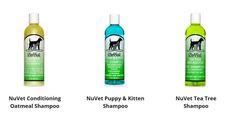 SHAMPOO & CONDITIONER: Remember that a naturally-reared puppy (eating species-appropriate foods) typically will not smell "doggy" like kibble-fed dogs often do. In fact, raw-fed dogs generally have very little odor at all, so with the exception of potty accidents or muddy playtime, if you are naturally-rearing your puppy, it will not be necessary to shampoo your puppy often. There are many shampoo products on the market and most are fairly expensive. For the price, NuVet Labs puppy shampoo & conditioner line is quite good - and one bottle lasts a long time; a “tearless” formula which removes odors, is pH-balanced, biodegradable and is detergent and soap free - it also comes in a large, 17 oz bottle. Regardless of where you purchase, be sure to find a shampoo which is pH-balanced for dogs... and don't bathe them with shampoo frequently. 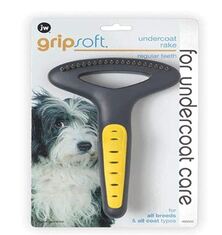 BRUSHES: We use two different kinds of tools for loose hair-remvoal. One is the typical pet brush with the plastic bristles on one side and the metal "slicker" bristles on the other. This cleans and detangles while removing the occasional loose hair. The other tool is called an "undercoat rake" and is fabulous for getting that shedding undercoat stripped out. (This is just an example of an undercoat rake. Most brands are similar.) If your puppy has a wooly coat or if you plan for an extra-special grooming session, you will also need regular hair-cutting scissors or clippers for trimming under the tail (bum-area) – This is called a “sanitary trim”. 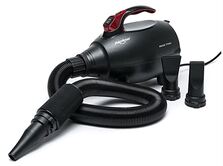 BLOW-DRYER Grooming isn't complete without a good blow-dry, especially during the spring and fall shed. During this time the puppies will blow its coat in preparation for the changing weather. A solid grooming session or two will head off weeks of hair floating through your home. Trust us. We use a blow-dryer designed for groomers and it is fantastic. Best. Purchase. Ever. (Well, almost!) 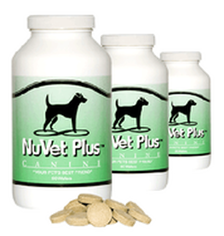 NUVET PLUS CANINE SUPPLEMENTS NuVet Plus Canine Supplements can be purchased directly from NuVet Lab at 800-474-7044. We use and recommend NuVet Plus Canine Formula and have for almost 15 years. They have other supplements as well, including a joint formula - as well as products for felines. NUVET LAB 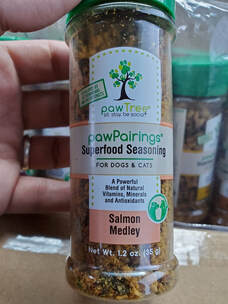 PAWTREE "pawPairings" from pawTree are a fun, tasty way to dress up your 4-legger's meals - while providing some extra, real nutrients from real foods! These are great, whether is "naturally-reared" (on real food only) or being raised up on kibble products. (We don't recommend a kibble diet but understand everyone is at a different place in their journey. These offer some variety and a bit of a boost too!) PAWPAIRINGS 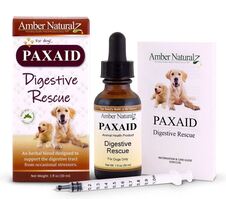 NUTRACEUTICALS Amber Naturalz has some amazing nutraceutical products that we recommend, but we consider “Paxaid” & “Vibactra Plus” as true essentials for your puppy first aid kit. Just fantastic products. We have used these for years. You can message us if you would like more information. 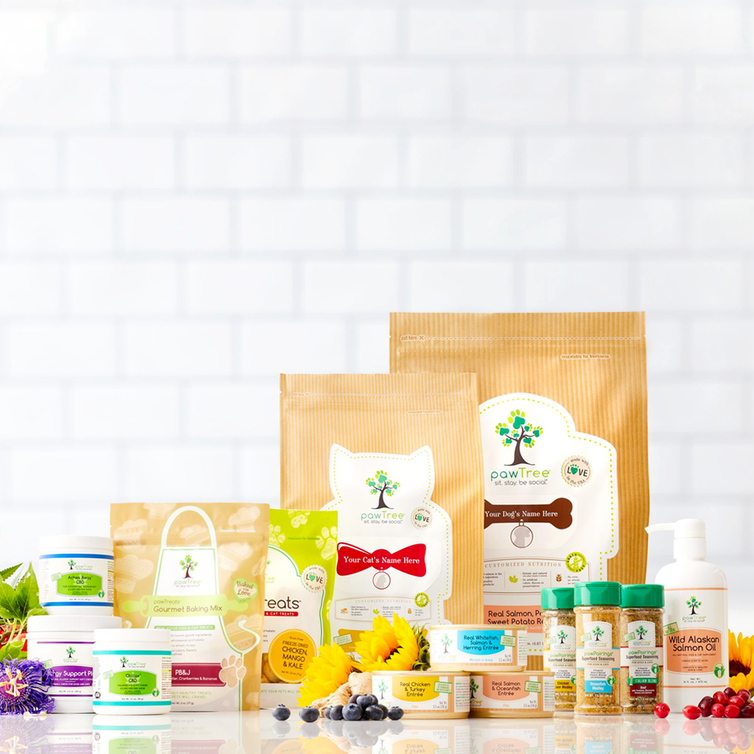 Some terrific products for naturally-reared or conventionally-reared canines! Freeze-dried training treats, Salmon oil and chews, CBD/Hemp products, flea and tick remedies, toys, food... the list goes on and on! Check out the site and the list of our recommended products – you may find something for your favorite 4-legger! PAWTREE 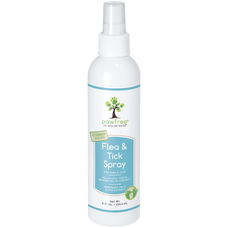 FLEA & TICK CONTROL: We are really not crazy about putting poisons on our dogs for flea & tick control, especially the monthly applications. Healthy dogs don't seem to attract fleas or ticks, except for the occasional straggler, so we can be pretty lenient about our practices. With proper feeding practices, most healthy dogs do not attract parasites in the way unhealthy dogs do. A malnourished or sickly animal will become run-down and overwhelmed very quickly by parasites, but this is not the case with very healthy animals. Parasites take advantage of the weak, and though they won't turn down a "meal" on a healthy animal, they don't seem to congregate like they do on an already compromised one. That said, due to climate, some areas are completely infested with parasites and it is impossible to control without some help. PAWTREE has a natural flea, tick and mosquito repellent that kills the buggers on contact. FLEA & TICK SPRAY There are some other companies with highly-rated natural products, such as Wondercide. We like several of their products. (Be careful with any products around cats, as cats are more sensitive.) FOOD: Food really isn't at the bottom of the list, but if you are bringing home one of our puppies, we have already discussed our feeding program with you at great length. If you just happened to visit us here, you may be unfamiliar with "natural-rearing" or the concept of feeding real, whole, fresh, raw foods... so you can visit our NATURAL REARING and CANINE NUTRITION sections for more information. For our puppy owners, the decision to focus on real foods is already set. I am including some additional ideas here as we do use a kibble product as well as raw foods for our weaning puppies as several from each litter will be shipping to their new homes - and airlines do not allow the use of fresh or raw foods during transit. Puppies have been eating Instinct Raw Boost Puppy food in the morning and evening, and fresh raw foods during the day. That should pretty well cover the basic supplies! If you have any questions, please feel free to call or email.
Jaque McHenry ©2021 www.runamokfarm.com The last year brought with it many challenges for those accustomed to traveling freely between states and far-reaching negative consequences for private citizens and businesses alike.
In a time when companion animals are desperately needed for companionship across the nation, the usual transport options have been limited, and in some cases, non-existent. Prior to the pandemic there were multiple options for breeders to provide puppies, kittens, birds and other companions to their new families, and arrangements were quick, simple and cost-efficient. As if all the restrictions themselves are not enough, confusion regarding what is and is not allowed has compounded pet transport even further. We will discuss this briefly here, but with a caution: In all instances follow basic CDC guidelines and use common sense when meeting with people. In states with full lock-downs or quarantine for folks traveling in from other states there are definite issues for all transport services, so please research before making arrangements for your area. Options available for most areas:
This does not cover pricing differences, scams citing "cargo" options with special containers or a large number of other important "must knows" about transport; this is just so prospective owners (as well as breeders) know there are options still available. Carefully research any choices thoroughly before making a purchase or paying for transport! WOOF! ~ Jaque THE PERFECT 4-LEGGER?
Whether you are a first-time prospective owner or an old-hand at selecting your next family companion, your hopes and expectations are similar. You want an attractive, healthy, long-lived dog, with a great personality and just the right activity level! Your dream dog is a devoted, loving companion, wants to please you and has an "on/off" switch! Just perfect! IMPORTANT TRAITS? Searching the globe you can find a million adorable puppies of various makes and models that would not be a suitable match for one reason or another. A pretty puppy who does not match your family temperament-wise will result in frustration and heartache. For a permanent family companion who will be a joy to live with, it is vital to consider the attributes which really matter. Health, temperament, structure, and activity level are all far more important than appearance. Now, it is absolutely fine to hold out for a particular "look", but cosmetic traits such as size, coat type, coat color, and eye color must fall in as lovely, secondary compliments to the sweet being you intend to bring into your family. YOU WANT YOUR PUPPY TO "CHOOSE" YOU? Over the years we have received countless requests from prospective owners expressing a desire to come and play with puppies so their puppy could "choose" them. It is a romantic idea, but usually ends poorly - as shelters and Craigslist rehoming ads can attest to. This approach quite literally bases a puppy's forever and an owner's next 15+ years on the whim of a tiny puppy with very little life experience and absolutely zero understanding of the ramifications of its fickle curiosity. A puppy waddling over to investigate a new human does not equate to the puppy "choosing" that person as its forever owner; the puppy is simply fascinated by the new scent, the new voice, the different shape... The puppy may be cute, curious, wiggly, and all sorts of precious mischief - but it is often the alpha puppy who approaches the unknown. Adorable, yes - but only a small handful of prospective homes are actually a good match for that alpha puppy. Likewise, perhaps the shy or timid puppy approaches because clothing still smells like the morning's bacon and egg breakfast or because the puppy is sleepy and accustomed to laying in its breeder's lap. A sleepy puppy always feels like a good match, but not when you get to your busy household and your new puppy becomes fearful, doesn't settle in well, and requires copious amounts of training. All this to say puppy has absolutely no idea that approaching a person will affect the outcome of its forever. Likewise, unless you are a breeder or trainer in your own right, a brief visit will likely not provide you the clues necessary to select between litter-mates. It is far better to really get to know a breeder - and for your breeder to get to know you, your family, your activities, expectations, training level, etc etc. A reputable breeder spends countless hours with each of their puppies, they know how the puppy interacts with humans, how they interact with other dogs, where they are in the litter (pack). Allowing a reputable breeder to offer selection input is 1000X more reliable than meeting a litter and having the puppy "pick" you. IN SUMMARY
Where to start? Talk with breeders at length about their programs, care and placement policies, as well as your desires and expectations. If a breeder feels like a solid match, ask for references (vets, specialists, puppy owners) and discuss their contract terms which should contain health guarantees, spay or neuter clauses for companion puppies as well as rehoming policies. If all sounds agreeable, then discuss individual puppies and their temperaments to see if the breeder believes one of their puppies would be right for your home. Set yourself and your future puppy up for success, not failure! ~ Jaque www.runamokfarm.com PUPPY PRICES RANGE FROM ONE EXTREME TO THE OTHER! Unless you are independently wealthy, we know you are searching for your perfect "dream puppy" while also keeping an eye on your budget. It is easy to get caught up in the moment when looking at adorable puppy pictures online, but practicing due diligence will prevent common purchasing mistakes, heartache and scams.
Now, since we are being honest... Most prospective Buyers would have to rearrange this list, to put #3 and #4 at the top. More honest... the majority of Buyers have not even really considered the first two items on the list. With over 60 years combined experience, we can tell you with certainty that online shopping has created a crazy mess for both Buyers as well as Breeders. Most Buyers are used to shopping online, so are quick to "Buy Now" - but reputable breeders do not operate this way as they care about finding the right match for each puppy. If you can click a button to "pay" for an online puppy, changes are you are dealing with a scam, puppy-mill or pet-broker... none are good news when looking for a lifelong companion. Let's talk about pricing and hit on other topics later. FAIR MARKET VALUE We all want the best "deal", but we also understand that in many cases, we "get what we pay for", simply meaning that cheap knock-off product may not be the great value we were promised. As with any market, the more money it costs to develop or produce a products directly affects the price a consumer pays for that product. When that product is also exceptional, unique or highly sought-after, the price-tag is even higher. While puppies are not "products", the concept is the same. Reputable breeders typically invest tens of thousands of dollars into their breeding programs for their foundation animals, housing, veterinary care, nutrition, health-testing, DNA verification, business attorney fees and more - before they produce their first litter. They then have considerable ongoing costs to ensure their animals stay healthy and produce sound offspring; they stay up-to-date on the best modern technology can offer and spare no expense to ensure their customers take are blessed with long-lived, healthy family companions. DETERMINING PRICE POINT FOR QUALITY PUPPIES To establish an average price estimate for this rare breed, price-lists from reputable breeders across the nation were analyzed and it was determined well-bred companion puppies of this breed range between $2500 - $6500. Online sources such as Facebook, Instagram, Craigslist and Puppy Advertising sites such as Lancaster or Greenfield will frequently advertise Arctic Spitz or Pomsky puppies for under this - sometimes significantly so... Unfortunately, nearly all such "sales" end in heartbreak: either poorly-bred, sickly puppy-mill pups or, more frequently, out-and-out scams. There are dozens of scammer websites which have cropped up, show-casing photos and videos stolen from legitimate breeders. Take your time to get to know your breeder! ~ Jaque There's no denying the Arctic Spitz (aka Pomsky or Miniature Husky) is incredibly darling, alluring, enchanting... so it's no surprise you may be daydreaming of the wilds of the Northern territory. How could you not?
Could this truly be the best of both worlds? All the comforts of modern, city living... yet owning your very own, pint-sized Husky! The perfect size for your city dwelling! You are in good company as there are a million other families are thinking the exact same thing. We receive inquiries almost daily asking whether one of our puppies would be a good match for an apartment or townhouse. They have darling temperaments, and they are smaller in stature, so a small living space seems like it could be a good fit... and, believe me, tons of apartment-dwellers are purchasing these cuties - but is this really a good match? We are concerned this breed is being specifically promoted for apartment-living. With moderate-to-high energy, these pups need ample time and room to run, play and burn off steam. The Arctic Spitz (Pomsky) is highly intelligent, so not only do they need to exercise their bodies, they need to exercise their minds. Crammed into a small dwelling with no real outlet can become boring in a hurry - as most two-leggers have found during the CV19 lock-down! A pup who is not exercised, socialized, trained, as well as an active member of its family will be more likely to act out with destructive or nuisance behavior, such as: Barking, howling, chewing, or going potty in the house. This is of course true of any setting, whether country or city, but the boredom created by living primarily inside a small apartment with very little exercise will exacerbate such behaviors. Before your dreams are completely dashed, it is possible to have a happy, healthy, well-exercised, well-adjusted pup living in a smaller town-setting. Absolutely possible... but it takes commitment, unfortunately more commitment than many owners discover they are able or willing to provide. Reputable breeders take time to get to know their prospective families - and want to be sure they are providing the right match for each home. If your current situation is not ideal, a reputable breeder will be honest with you - even if it means they are passing on a sale. We have placed a few dogs into apartment setting over the last 35 years, but have passed on far more than we have approved. Our answer is never an instant "no", because there are so many options available nowadays, but it is important for a breeder to understand their puppies' individual temperaments and also to know when a prospective owner is truly prepared for ownership in such a setting - so a lot of discussion and a lot of preparation. We want you and your future puppy to both be happy with your decision! WOOF! ~ Jaque 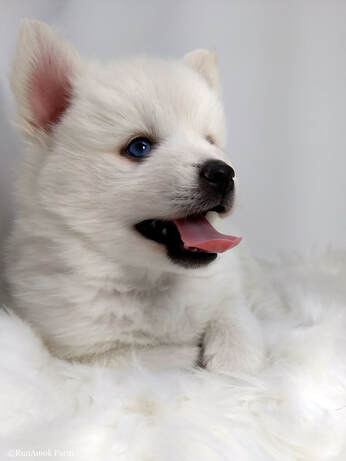 Do you know what the most common “disease” affecting dogs is? If you have a dog over the age of 2, you may have an idea... but there are so many common conditions it may seem like a bit of a toss-up! If your guess is "periodontal disease", you are correct. It is estimated the majority of dogs over 24 months are displaying mild signs of periodontal disease, but most owners do not recognize their dog is developing a serious condition. In the first stages, gingivitis affects the gums - causing swelling, mild bleeding, a build-up of bacteria and bad breath. The periodontal disease is not yet damaging the structure of the teeth and is still considered reversible. By age 36 months however, a staggering 2/3 of dogs are progressing into periodontitis, with many already in need of dental scrapings and even extractions. Some might prefer to shrug this off, believing their dogs are not at risk... but the statistics are a sad reality. I know of a 6 year old Jack Russel Terrier whose owner called me after his dental surgery had been completed. She was hoping for diet suggestions as the poor fellow could barely chew; they had just removed 18 teeth. In chatting with her, I was horrified to learn they had removed 6 other teeth just the year prior! Unfortunately, while a rather extreme example, veterinary dental extractions are commonplace in this modern world. Not only can periodontal disease cause painful swelling, abscesses, loose and rotting teeth... the bacteria ingested can create a whole slew of serious, chronic health conditions. Periodontal disease in dogs is linked to heart disease, liver disease and kidney issues, to name a few. Periodontal disease kills. As if the direct effects of this disease are not enough, there are serious risks with treatment as well. Dogs are frequently put under anesthesia to treat abscesses, scaling and extractions of loose or broken teeth. Bacteria can be introduced into tissues when gums are sliced or cut, or through the removal of teeth. It is fairly commonplace to prescribe a round of antibiotics after dental surgery, but this opens the animal to side effects ranging from digestive issues such as vomiting and diarrhea to secondary infections and allergic reactions. Anesthesia is also a concern... a very real one. My dad lost his beautiful 6 year old Yorkshire Terrier when she died during a “routine” dental cleaning. It nearly broke him. If you are a dedicated pet owner, you may be feeling some concern now – and also feeling a tad suspicious. What am I selling? I get it. It seems everyone has their hand out after dropping “scary” medical statistics, right? The good news is I am not selling the “next best thing in dental care!” I am going to share, just very briefly, how we avoid dental issues with our dogs and maybe this will inspire you to research for your own 4-legger. We have over 50 years, combined, experience raising dogs. What we've learned is simple. Modern care isn't necessarily what it is cracked up to be. Modern foods and treats, while convenient, do not necessarily promote good health. (We just need to sit in a veterinary clinic for a day, observing all the dogs and cats, suffering a myriad of health issues.) I could go on for hours regarding pet foods and damage done by less-than-suitable ingredients (hours and hours, true story), but it isn't just cheap foods... it is packaged, dry dog foods. They are not and can never be a natural food source. When we veer away from real foods in preference of unnatural products, we must face the consequences... and one of the most glaring consequences is periodontal disease in dogs. Check out our CANINE CANINES page for some pretty great dog dental photos! I think it will encourage research... and researching is always good! Wishing you all the very best! Jaque A REPUTABLE BREEDER'S INVESTMENT 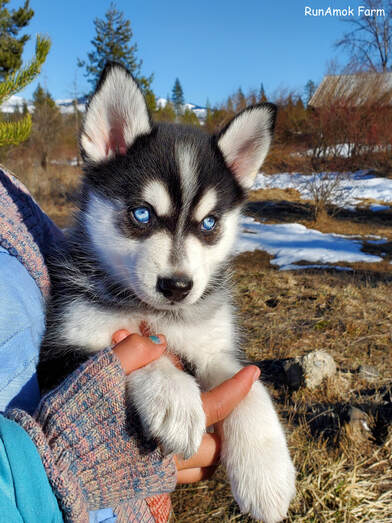 A reputable breeder is not a pet store, indiscriminately selling pets to just anyone who wanders through a check-out line. Reputable breeders invest their time and their money into their programs, but more than this, they invest their hearts and every waking moment into their animals. They pour their "all" into little lives - lives which need constant love, devotion, fresh food and water, training, cleaning, grooming and occasional medical attention - sometimes at a moment's notice. It goes far beyond tending and basic care, however. Hundreds, even thousands, of hours are put into researching their given breeds, nutrition, training, acute and chronic illnesses, genetic testing and more. They become experts in everything "canine"! Health testing (genetic as well as exams), feeding, play, potty training, imprinting, socialization... There's more! Not only does a reputable breeder provide all the important "firsts" for their sweet babies, they must also consider carefully what the next 12-17 years will hold for every little life produced under their watchful gaze... After all, the point of their hard work is to match their little loves with the right families! The end-goal of most businesses is simply to sell their product to whatever Customer has the cash or credit to make a purchase. Aside from basic warranties, the Seller gleefully tidies up the sale and wishes the Buyer well. For a reputable breeder, it is not nearly so simple! PLACEMENT POLICIES? Done right, placement of each puppy requires a huge amount of consideration for a breeder. What type of families are a good match for their particular breed? What types of families are a good match for each of their puppies? While a breed should be fairly consistent in temperament, instinct and drive, there will always be subtle variations, making every puppy unique in temperament. Reputable breeders take responsibility for placements, investing considerable time to get to know prospective owners. They educate potential matches regarding breed standards, nutrition, health, temperament, training and more. Not only does the prospect need to be "on board" with the breeder's unique program, they must be able to provide the time, exercise requirements and space needed to raise a happy, healthy dog - taking into consideration the breed as well as the individual puppy. No one knows this more than the reputable breeder. Am I beating these points to death?? Maybe so, but if you are serious about finding the right puppy, there is no better resource than the insight of a solid breeder. If you are not the right match, they will refuse your money and help you find the right puppy, even if it means they refer you elsewhere. WHAT DOES A REPUTABLE BREEDER OFFER? IF all is considered and a prospective owner is, in every way, a good match for a puppy, the next step is a written contract. A reputable breeder will protect the Buyer's interests by providing a well-written, detailed contract noting "spay/neuter" or "breed prospect" expectations as well as solid health guarantees (covering both communicable disease as well genetic conditions), breeder support and clear stipulations; they will do so while also keeping the puppy's well-being in mind, noting expectations for a life-long commitment to providing adequate nutrition, medical care, and an "always home" policy if unexpected rehoming were to become necessary. Exploring the "always home" policy a little deeper. Even with the best screening and the most wonderful owners, there are instances which may require a dog to need rehoming. A reputable breeder will have an "always home" policy, meaning the breeder will either assist with rehoming or welcome their babe home, no matter the age. *This means their contract specifies the animal will never be placed in a shelter or rescue. Period. VARIED POLICIES Breeders come from many backgrounds and have all had different "mentoring" and experiences. It should be expected they will have slightly (or vastly) different policies. This does not mean a breeder with different policies is "unethical"... It just means they may not have as much experience in a given area, or have not yet faced a particular situation. We are all at different stages in our journeys... and as long as a breeder is putting in the time and effort to care for their animals as well as their puppy owners, this is great! In the search for the "right" breeder though, the things above really are important. If a breeder isn't taking the time to educate or providing true support; if they are all about the money; if they don't grill you about your home and your intentions for life-long care; if they don't have a back-up plan for their pups who will need rehomed... these are warning signs. WHAT WE LOOK FOR WHEN INTERVIEWING PROSPECTIVE HOMES When we select families for our puppies, we look for families truly committed to providing a "forever" home and all the love, companionship, training, exercise, play and care that comes with it... Families seeking a companion they will consider a "family-member", but not families who have lost touch with the fact their new companion is an animal... with many needs different than our own. Animal ownership isn't just about OUR emotions and how a darling, fuzzy puppy makes US feel. Animal ownership is about the symbiotic relationship between human and beast. The love and devotion they give us must be reciprocated... but in a way that meets their needs. It is our responsibility to provide our puppies homes which understand their physical and "emotional" needs. We owe it to them to pass by a dozen or more prospective homes who are not the right matches... even if that means we are holding a puppy back for weeks or even months until just the right family comes along. Is that inconvenient? Sometimes it really, truly is. But finding that right match isn't about who thinks a puppy is "cute" or who waves a handful of green... Finding that perfect match - a lifetime of love and companionship for both the owner as well as the puppy - there are few things more rewarding than this. Jaque, RunAmok Farm, Canines Naturally |
AuthorOver 70 years combined experience raising happy, healthy canines. Most would consider us to have reached "expert level" when it comes to everything canine, but the truth is, there will always be more to learn. Archives
March 2021
CategoriesAll natural, simple ingredient freeze-dried treats! How GOOD does that sound!?
Introducing pawTree’s nutrient-rich Wild Alaskan Salmon Oil. Not all salmon oil is the same.
|
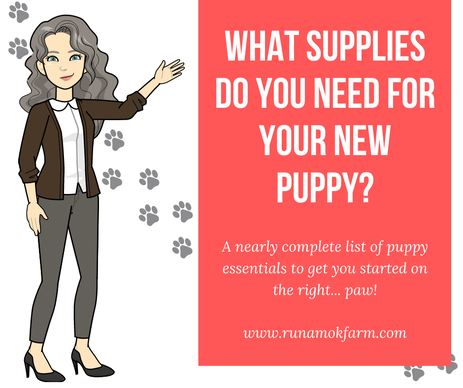
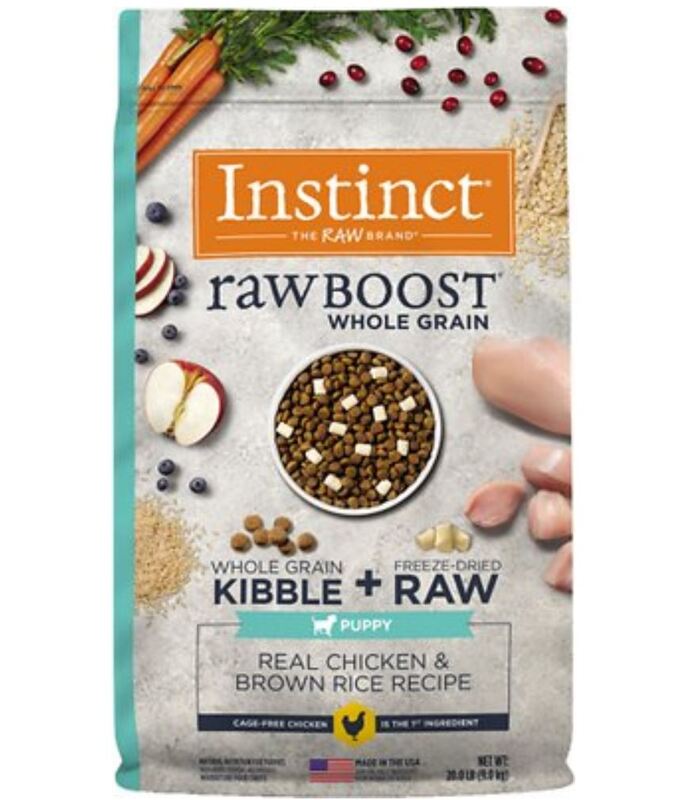
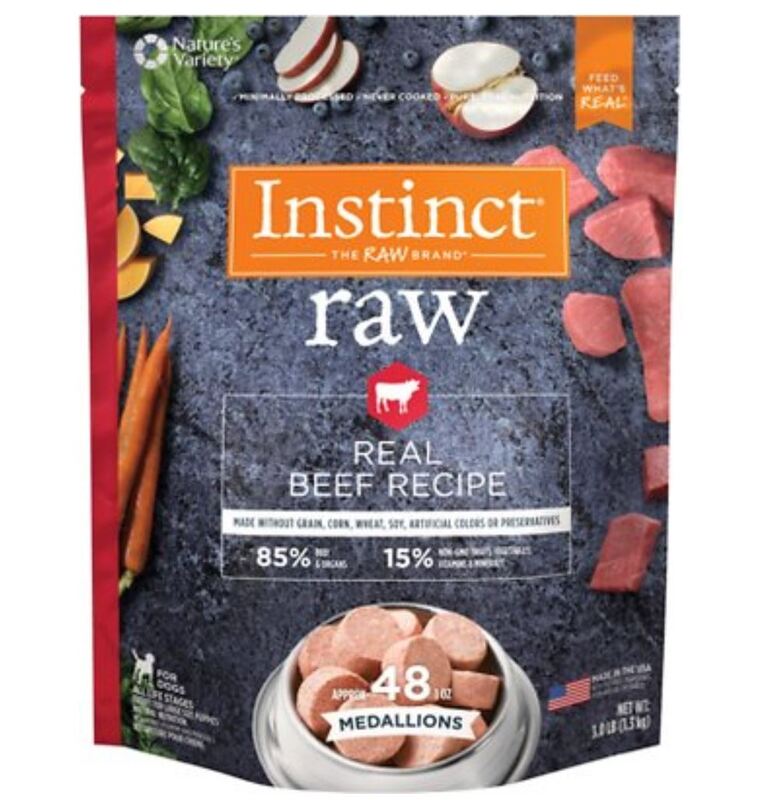
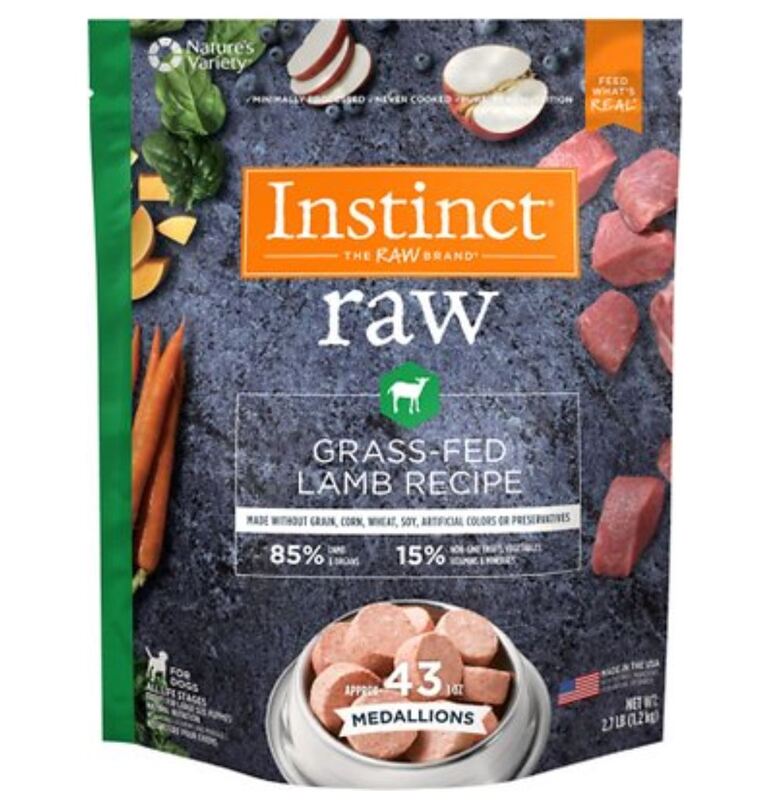

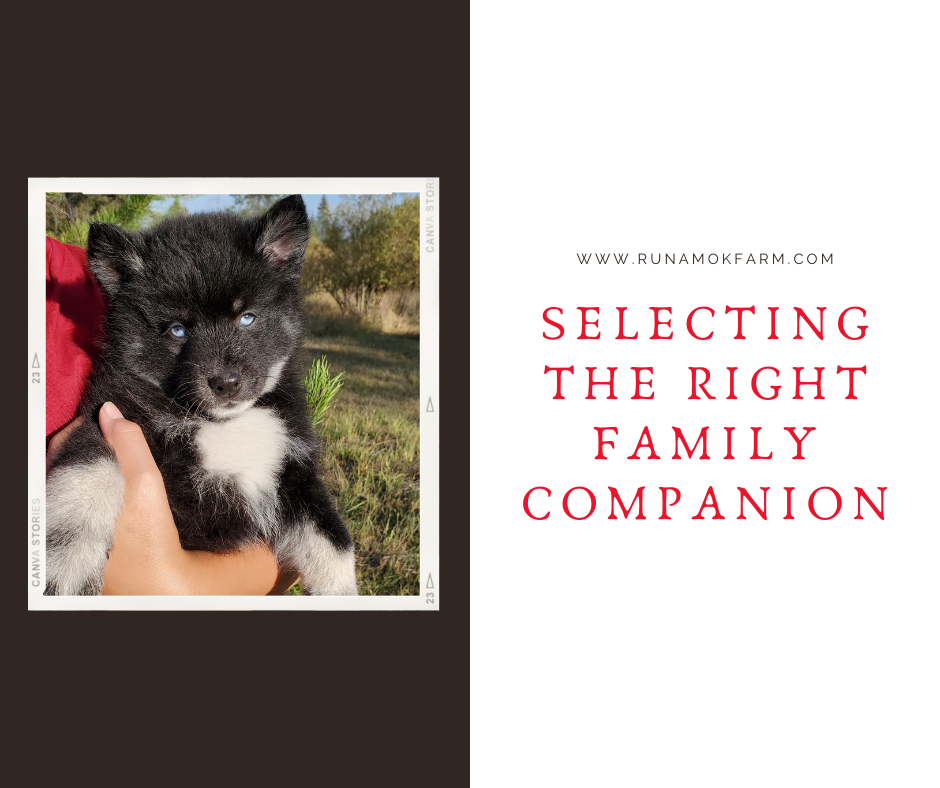

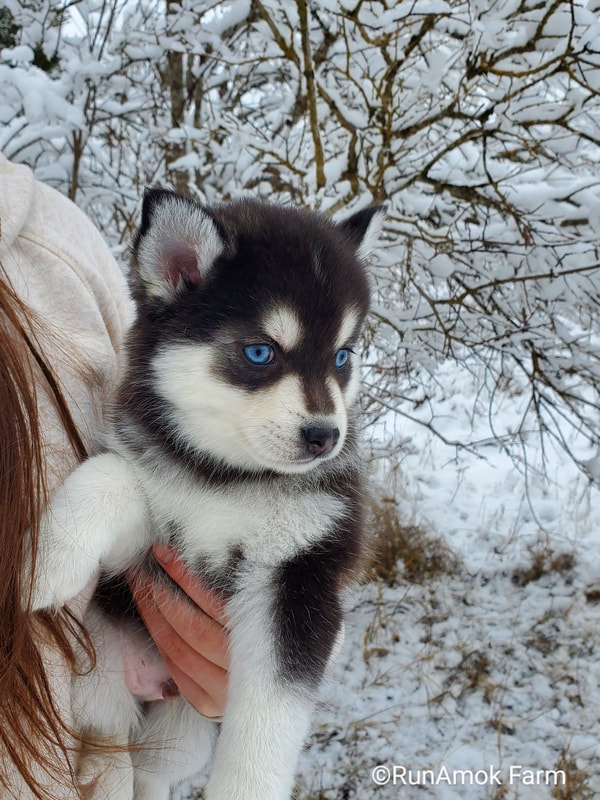

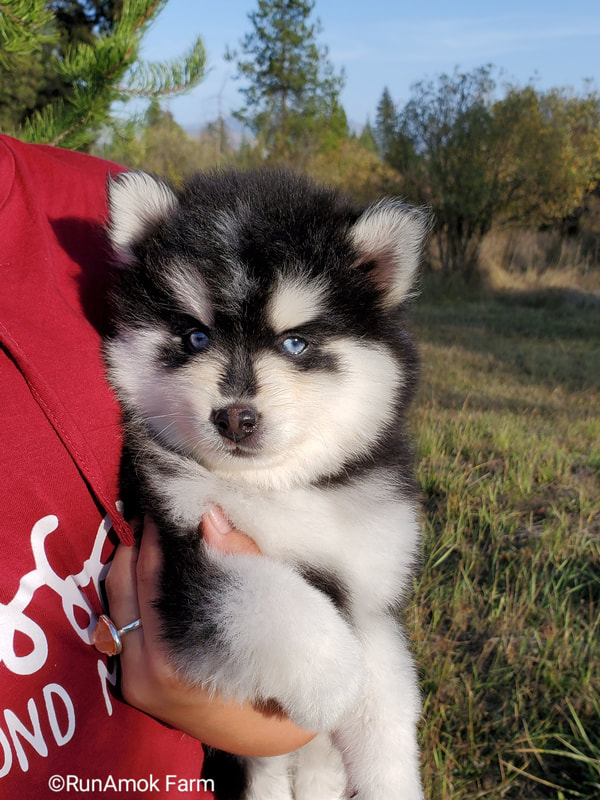
 RSS Feed
RSS Feed
